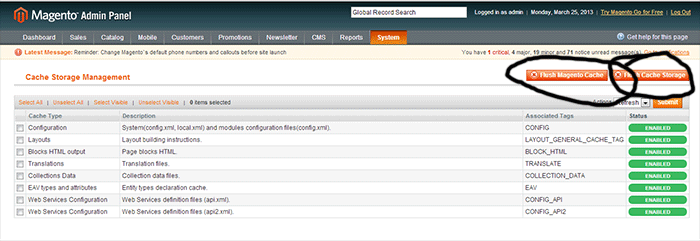Difference between revisions of "Clear Magento Cache"
From Brian Nelson Ramblings
(Created page with "==How to Clear your Default Magento Cache (Disk)== When it comes to clearing your Magento Cache, you have two basic ways to complete this. 1) Login to your Magento Admin Pan...") |
(→2) Via the Linux Command Line) |
||
| (2 intermediate revisions by the same user not shown) | |||
| Line 3: | Line 3: | ||
When it comes to clearing your Magento Cache, you have two basic ways to complete this. | When it comes to clearing your Magento Cache, you have two basic ways to complete this. | ||
| − | 1) Login to your Magento Admin Panel | + | ===1) Login to your Magento Admin Panel === |
| − | + | ||
| + | Navigate to | ||
| + | System -> Cache Management | ||
[[File:Clear-magento-cache.png]] | [[File:Clear-magento-cache.png]] | ||
| − | 2) Via the Linux Command Line | + | Click on the Flush Magento Cache and Flush Cache Storage buttons |
| + | |||
| + | ===2) Via the Linux Command Line=== | ||
| + | You just need to clear all the cache files from your cache directory | ||
| + | Navigate to your home directory and run the following command | ||
| + | rm -fr var/cache/* | ||
| + | |||
| + | Now your cache has been cleared. | ||
| + | |||
| + | Running the above commands can fix alot of issues are having with Magento | ||
| + | |||
| + | You may also want to clear your sessions | ||
| + | |||
| + | rm -fr var/session/* | ||
Latest revision as of 11:33, 21 August 2013
How to Clear your Default Magento Cache (Disk)
When it comes to clearing your Magento Cache, you have two basic ways to complete this.
1) Login to your Magento Admin Panel
Navigate to
System -> Cache Management
Click on the Flush Magento Cache and Flush Cache Storage buttons
2) Via the Linux Command Line
You just need to clear all the cache files from your cache directory Navigate to your home directory and run the following command
rm -fr var/cache/*
Now your cache has been cleared.
Running the above commands can fix alot of issues are having with Magento
You may also want to clear your sessions
rm -fr var/session/*
